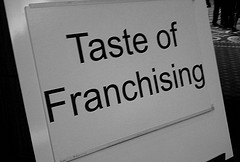
As fate would have it many of us who were endowed with an entrepreneurial spirit were not favored with an idea for a marketable product or a killer concept for a service. Acquiring a franchise can unleash our inner entrepreneur even if we lack a product or service concept we can call our own.
Buying a franchise can be the ticket to owning your own business and moving forward in your financial journey. The variety of franchises available can be overwhelming, but Entrepreneur.com has favored us with a list of the top 500.
Top Franchises
The top five on the list may surprise you.
- Anytime Fitness
Founded in 2009, this company has about 2500 franchisees globally, 1981 of which are located in the United States and Canada. As the name implies, these are gyms/fitness centers that are open around the clock. The firm is based in Hastings, Minnesota and is privately held. Estimated annual revenue … $23.9 million.
- Hampton Hotels
Hampton Hotels was acquired by Hilton Worldwide Holdings Inc. (HLT) in 2009. Hilton continued the franchising model Hampton had begun in 1984. They have just shy of 1950 franchisees worldwide with the bulk (1858) located in the United States. The corporation is based in Maclean, Virginia and is publicly held. Hilton’s gross annual revenue in 2013 was $9.74 billion.
- Subway
Doctor’s Associates, Inc. D/B/A Subway was founded in 1965. It is among the largest franchisors on the planet, boasting just under 42,000 locations spread throughout 106 countries. The corporation is privately held and headquartered in Milford, Connecticut. Estimated annual revenues are around $32 billion.
- Supercuts
Supercuts is a wholly owned subsidiary of Regis Corp. (RGS), founded in 1954. There are approximately 2300 Supercut franchisees in the United States and Canada. Additionally, a substantial number of Supercuts are company owned locations. The business is publicly held and based in Minneapolis, Minnesota. The company boasts annual revenues of just over $2 billion.
- Jimmy John’s Gourmet Sandwiches
Jimmy John’s Gourmet Sandwiches is a privately held company founded in 1983. There are over 1800 franchise locations, all in the United States. Jimmy John’s is headquartered in Champaign, Illinois and while no estimated annual revenue figures could be found for the franchisor, Jimmy John’s says that 18 selected franchisees, opened prior to 2009, were averaging more than $1.4 million in sales. The locations were very likely “cherry picked,” and do not reflect the average for all locations.
What Will a Franchise Set Me Back?
The franchise fee for each of the top five ranges from a low of $15,000 to a high of $65,000, but there are other expenses you must compare. See the table below:
| Anytime Fitness | Hampton Hotels | Subway | Supercuts | Jimmy John’s | |
| Franchise Fee | $20,999 – $26,999 | $65,000 | $15,000 | $29,500 | $35,000 |
| Total Investment | $56,299 – $353,900 | $3.695 -$13.524 million | $85,100 – $262,850 |
$108,750 -$203,600 |
$300,500 – $489,500 |
| Royalty Fee | $499/month | 6% | 8% | 6% | 6% |
| Net Worth | $250,000 | N/A | $80,000 – $310,000 | $500,000 | $300,000 |
| Liquid Assets | $70,000 – $100,000 | N/A | $30,000 – $90,000 | $150,000 | $80,000 |
Clearly, even the least expensive franchise requires a significant investment.
Pros and Cons
In the interest of time, I will stick with just two major pros and two major cons, as seen from my perspective.
Pros
- While opting for a franchise is no guarantee of success, your odds of succeeding are greater because you have a proven business model, support from the franchisor and instant brand recognition in a proven market.
- Starting your own business is a journey of discovery. Frequently you discover you haven’t the capital needed to accomplish your goals. A franchise allows you to understand your capital requirements in advance, sparing you most of the unpleasant financial surprises.
Cons
- You may find that you feel more like a manager than an entrepreneur. Franchises have rules that offer little leeway for independent thought and action.
- Handing over 6 to 8 percent of your gross revenues to the franchisor may not sound like a big deal, but with profit margins for small businesses in the 10 to 20 percent range, it is a substantial bite.
In my view, the concept of the franchise works best for people with an excellent track record in management. These individuals have the skill and experience to implement policies and procedures. The entrepreneurial personality will run the risk of being constantly at odds with the franchisor’s rules, processes, and procedures, by nature, preferring to implement his/her own ideas with regard to running the business.
Starting your own enterprise is certainly more complex and rife with unknowns—you are basically on your own, which something to consider when you are deciding between a franchise and your own company.
***Photo thanks to RE:group***
You must log in to post a comment.